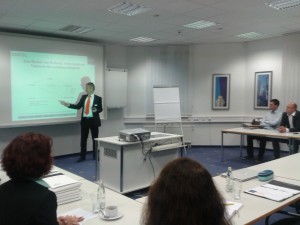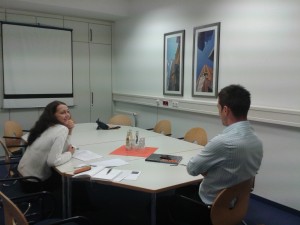A research team from the German Graduate School of Management and Law in Heilbronn, Germany, has developed a system to measure the intercultural openess of German companies, which should orientate immigrants seeking a job in the country. Rafael González García de Cosío, a former member of AEGEE-Sevilla, has been involved in the research and writes about the results.
 There’s always a time when the student life comes to an end. When long holidays, summer universities and autonomy are suddenly over. A new chapter starts in everyone’s life when time arrives to look for a job. However, because of the economic crisis in many European countries, thousands of young people are deciding to pack and look for a better future abroad, even fearing a lack of integration in their planned destinations. The favourite for many is Germany, which unlike other nations in the continent has a strong economy and is calling for foreign workers. Thanks to AEGEE, many candidates already have an open mind and the cultural baggage needed for integration. But are companies also open to foreigners?
There’s always a time when the student life comes to an end. When long holidays, summer universities and autonomy are suddenly over. A new chapter starts in everyone’s life when time arrives to look for a job. However, because of the economic crisis in many European countries, thousands of young people are deciding to pack and look for a better future abroad, even fearing a lack of integration in their planned destinations. The favourite for many is Germany, which unlike other nations in the continent has a strong economy and is calling for foreign workers. Thanks to AEGEE, many candidates already have an open mind and the cultural baggage needed for integration. But are companies also open to foreigners?
A research team called AIKO -Auditierung Interkultureller Offenheit (Audit on Intercultural Openess)- from the German Graduate School of Management and Law in Heilbronn has found a way to measure how interculturally open German companies are when facing foreign applicants.
The objective of the research, according to one of its members, Frederike Hoffmann, is to ‘‘analyse the intercultural skills of institutions and enterprises‘‘, through categories and indicators of intercultural openess. In addition, the idea is to promote the welcoming culture of companies towards new incomers and to foster work structures withouth discrimination in Germany. As a result, the goal of the whole process is to struggle against the skills shortage in certain regions.
The research is based on surveys within German companies and institutions. The AIKO team has already gone through several organisations, from kindergardens to explosion-proof companies. There, the team interviews workers and managers in order to analyse the application of their scientific indicators in the organisation. As the researcher Klára Denzin puts it: ‘‘thanks to guided interviews and expert workshops it was possible to determine categories and indicators that helped to measure the rate of the intercultural openess‘‘.
 But what are the results so far? What are the strenghts and the weaknesses of these companies? ‘‘Essentially, companies don’t fail in terms of intercultural openess. In the companies, the first strenght was that they agreed to express themselves. That already shows a certain openess‘‘, says Raimund Rück, a member of the team. The director of the study, Prof. Dr. Christopher Stehr, goes further and summarizes the success of German institutions in four points: the phenomenon of the tandem partner who introduces the new incomer into the organisation, the presence of people in the company who already speak the language of the new worker and help them with the integration, the adaptation of both employees and companies to the new situation and the induction time that enterprises give their employees to learn all processes. But Prof. Stehr also reminds the weak points of German companies: ‘‘they underestimate workers with different cultures. But they should adapt to the change. Companies think about workers joining them, not about people. They should be integrated in the network, and in some of the companies we visited, that is hard to fulfill‘‘.
But what are the results so far? What are the strenghts and the weaknesses of these companies? ‘‘Essentially, companies don’t fail in terms of intercultural openess. In the companies, the first strenght was that they agreed to express themselves. That already shows a certain openess‘‘, says Raimund Rück, a member of the team. The director of the study, Prof. Dr. Christopher Stehr, goes further and summarizes the success of German institutions in four points: the phenomenon of the tandem partner who introduces the new incomer into the organisation, the presence of people in the company who already speak the language of the new worker and help them with the integration, the adaptation of both employees and companies to the new situation and the induction time that enterprises give their employees to learn all processes. But Prof. Stehr also reminds the weak points of German companies: ‘‘they underestimate workers with different cultures. But they should adapt to the change. Companies think about workers joining them, not about people. They should be integrated in the network, and in some of the companies we visited, that is hard to fulfill‘‘.
The next step in the research is to establish a certification process. The AIKO team wants to provide the organisations with a gold, silver or bronze qualification certificate, which will encourage foreign applicants to apply for a job, as well as stimulate their integration once hired by the company. According to Mr. Rück, that would ‘‘contribute to the economic promotion […] and create added value to the companies in the region‘‘. And the aim of the team is that the system expands to other areas of Europe. This way, not only the organisations will benefit, but students and other immigrants will also be able to carry out their adventures without the fear of feeling excluded. As a result, both AEGEE members and businesses will contribute to a more open and multicultural Euorope.
Written by Rafael González García de Cosío, AEGEE-Sevilla

